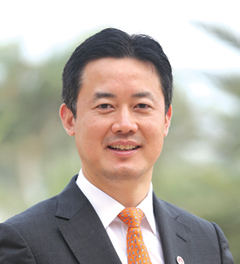 Charles Yang
Charles YangKUWAIT: Huawei, a leading global ICT solutions provider, and the SAMENA Telecommunications Council hosted the fifth annual Telecom Leaders' Summit in Dubai on Thursday. Held under the theme "Building the Digital Economy of the Middle East", the event was a platform for leading telecommunications companies, regulators, government bodies, technology providers and consultants across the Middle East and Africa to discuss how to frame practicable ICT strategies that will enable governments and organizations to reap maximum socio-economic benefits from digital transformation.
In addition to being the strategic partner of the SAMENA Summit for five consecutive years, Huawei held three sub-forums that guided discussions on key industry trends like 5G and All-Cloud Transformation, and presented the Global Industry Vision 2025 and the Global Connectivity Index 2018. Huawei also showcased its latest 5G E2E solutions, launched the "Middle East first Multitenant IoT Hosting Center" and introduced its 5G Ecosystem Program in the Middle East.
"This year, Huawei's new corporate vision is to bring digital to every person, home and organization for a fully connected, intelligent world," said Charles Yang, President of Huawei Middle East. "With 5G and artificial intelligence just around the corner, the digital world - where all things will sense, all things are connected, and all things are intelligent - is within reach. We will continue our investment on intelligent devices, to enhance people's work and entertainment experience. We will continue our investment on home broadband network, to enrich people's lives at home. We will continue our investment on network, cloud, and IoT, to inspire innovation in organizations. The SAMENA Telecom Leaders' Summit is a platform for us and all industry partners to collaborate to fulfill this mission."
Huawei's first sub-forum was "5G is Now." The forum focused on the imminent arrival of 5G and its support to national transformation plans across the region, in addition to the key role 5G will play in the Middle East's digital transformation journey. The 5G era is growing close, and preparation is necessary to build up network spectrum, transport, sites and business cases, in order to facilitate its approach. Huawei recommends Middle East operators and government agencies to support spectrum neutrality and use test-driven development to construct Mobile Broadband networks in order to rollout 5G as fast as possible. The sub-forum was an opportunity for Huawei and other ICT leaders to discuss how to address remaining challenges and opportunities on the road to 5G. In addition, the "5G Ecosystem Program in the Middle East" was launched with Huawei partners at the 5G sub-forum. The program aims to inspire the 5G ecosystem in the Middle East, as the 5G End-to-End commercial use is closely related to 5G ecosystem.
Global industry vision
The second sub-forum was "Huawei Global Industry Vision 2025 and Global Connectivity Index 2018" where Huawei presented two studies. First was the Global Industry Vision (GIV) 2025, a new forward-looking report that provides quantitative and qualitative predictions about the future of industry and society. According to the report, by 2025 all things will be able to sense and all things will be connected, bringing us all into a world where everything is intelligent. Second study presented at this sub-forum was the Global Connectivity Index (GCI) which included 80 countries globally and examined how each is progressing in its digital transformation based on 40 unique indicators that cover five technology enablers: broadband, data centers, cloud, big data and Internet of Things. Nine countries from the Middle East were included in the index. The GCC figured prominently, with the UAE ranking highest among Middle Eastern countries, followed by Kuwait, Bahrain, Saudi Arabia and Oman, all placed in the "adopters" category in the report.
Huawei's third sub-forum was "All-Cloud Transformation in the 5G era". The forum was an occasion to discuss how cloud transformation can help accelerate the deployment of 5G networks in the region. The 5G era requires high-bandwidth, large-connectivity, low-latency user experience. It places higher requirements on the operator's cloud data center architecture and infrastructure, software defined anything, anything as services, services become to AI: these are more flexible, smarter and more reliable.
At the summit, Huawei also announced the launch of the "Middle East first Multitenant IoT Hosting Center" in order to facilitate IoT local ecosystem incubation and accelerate IoT business development in the region. Based on this IoT Hosting Center and ecosystem enablement strategy, Huizhong and Hayat are the first partners to obtain "The Middle East IoT Hosting Center 1st NB-IoT enabled certificate"
Huawei advocates openness, collaboration, and shared success. Huawei is an active member of more than 360 standards organizations, industry alliances, and open source communities, where they work together on mainstream standards and lay the foundation for shared success. Moreover, Huawei focuses on three domains - fully-connected networks, intelligent computing, and device innovation - and continues to invest in products, technologies, basic research, engineering capability improvement, technical standards, and industry ecosystems, with the aim of supporting customers in their digital transformation journey, and lay the cornerstone of an intelligent world.









